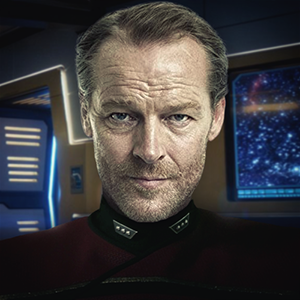The timer hit zero with a whistle like a sabre’s slice, cutting through the tense air on the bridge of the Susan B. Anthony. As if guilty, Lieutenant Lourde turned from her post at Science and said, ‘Eighteen hours, Captain.’
Captain Camarero remained seated, killing the timer’s chime with a jab at her armrest controls. ‘Sensor readings?’
‘None,’ said Lourde without moving. At Camarero’s stern look, she winced and turned back to her post. This was more than another last-second consultation of her sensor readings. This was fresh scans, fresh double-checking of their sensor calibrations, another comparison of their readings over the last hours.
It took three minutes before Lourde looked up again. ‘Confirmed, Captain. There’s still no sign of the Sphere.’
‘That doesn’t mean they’re not there,’ said Commander Tabe, stern and suspicious at Ops. ‘Evidence of absence -’
‘Is not an excuse for paranoia.’ Camarero drummed her fingers on the armrest, lips setting to a thin line. ‘We’ve set this timer for a reason. Watched for days for a reason.’
‘It’s the Borg, Captain,’ said Tabe. ‘We can’t be too careful.’
‘I’m aware it’s the Borg, Commander,’ she replied with the faintest edge to her voice. Not too much, though – it was an impersonal chiding, a reminder from captain to senior officer that emotive pleas were unnecessary. ‘But we have to confront the enemy that really exists. Not the one living in the shadows of our scared thoughts.’
In the pause, Lourde shifted her weight. ‘Uh, meaning? Captain?’
Camarero sighed. ‘The reality is that we don’t understand the Borg. We’ve spent weeks monitoring that Sphere as it’s traversed our border, scanning worlds and outposts from a distance. We’ve all waited for the other shoe to drop, for it to strike. But just because we fear that doesn’t make it more likely than the Sphere was on a reconnaissance mission it’s now finished.’ She stood. ‘Assuming the worst does not automatically make us wise. It can be just as blinding as undue optimism. We follow the evidence. Lieutenant Edrun, put a call via my ready room to Fourth Fleet Command. It’s time to report in. Commander Tabe, you have the bridge.’
Tabe watched as she stepped away from the command chair. ‘What is our conclusion, Captain? That the Sphere is gone, and the Borg aren’t coming back?’
‘We follow the evidence,’ Camarero reminded him as she crossed the bridge. ‘I believe the Sphere has left, Commander. Our findings tell us nothing about the future.’
‘Withdrawals along the Beta Quadrant frontier. Reduced sightings in the Gradin Belt.’ Fleet Admiral Ramar folded his arms across his chest as he regarded the holographic projection of the strategic star map billowing across the fleet’s operations centre, deep in the heart of Starbase Bravo. ‘Is this over, Alex?’
Vice Admiral Beckett tilted his head this way and that as he rested his hands on the edge of the panel. ‘Over, when we’re talking about the Borg…’
‘Oh, I was about to assume that because they’re out of sight, they’re done; we’ll never see them again.’ Irritation rang through Ramar’s voice, and he mimed tapping his combadge. ‘Ensign, cancel that order of champagne for all Fourth Fleet captains -’
‘I believe,’ Beckett pressed on, duly cowed by Ramar’s mockery, ‘that the recent bout of activity from the Borg Collective has subsided. Yes, sir. Captain Camarero’s report is the latest to confirm there are no more sightings of Borg ships anywhere we can see in the Beta Quadrant.’
‘What about the Delta Quadrant?’ asked Dahlgren, visibly trying to hide his satisfaction at Ramar shutting Beckett down.
‘Inevitably, a little more complicated.’ Beckett tapped a button and the map zoomed in on the Gradin Belt. ‘I dispatched the Caliburn to report on their wider movements out there. They gathered intelligence from local allies, launched deep-space probes, and conducted their own surveillance. The Borg borders have moved… but not necessarily expanded.’
As he waved a hand across the map with the shining green of known Borg space clutching the starscape of the Delta Quadrant like a parasite, the borders warped and twisted in acknowledgement of fresh intelligence. ‘As you can see, in many areas, they withdrew. In others, they expanded. On the whole, however, their territory has contracted. Captain Hargreaves is continuing to investigate, but his working theory is still concerning.’
Ramar lifted his chin in the pause. ‘Go on.’
‘His theory,’ Beckett emphasised, clearly prepared to take credit if Hargreaves’s work was well-received and otherwise cut him loose, ‘is that they’re consolidating. The locations they’ve notably not withdrawn from or expanded to seize are more resource-rich. The areas they’ve pulled away from have less logistical or strategic value.’
‘They have less,’ Dahlgren mused, ‘but they’re using it more efficiently?’
‘Just so,’ said Beckett with a nod. ‘Then we come to the report from the USS Daedalus. Or, rather, their new friends from Unimatrix Zero.’ Another press of a button brought up that mission report on the projector, but Beckett looked to Dahlgren now. The diplomatic intricacies of such an operation were far more the deputy fleet commander’s purview.
Dahlgren sighed. ‘If the xBs of Unimatrix Zero can be trusted – and I speak of accuracy, not sincerity – then Admiral Picard did, actually, kill the last Queen at Jupiter. That’s just not the end of the Collective.’ He looked at Ramar. ‘The Unimatrix Zero survivors say that Borg Queens are, themselves, an… an adaptation. In the face of certain threats, certain challenges, the Borg need a focusing force. After they encountered the Federation, they manifested a Queen – Queens. They directed the Collective, particularly against us. That maybe explains some of the strange… personal touches, even vendettas, that the Borg seem to have manifested in a few of our encounters.’
‘And now, for whatever reason,’ chimed in Beckett, obviously unwilling to wholly sacrifice a dramatic reveal, ‘they have no more Queen. They’ve returned to operational parameters much closer to our early encounters with the Collective.’
Ramar didn’t look at either man for a few moments, eyes on the report from the Daedalus, the images of the Exodus shining bright before them. ‘So they come and go from our borders without disruption or attack. So our away teams have been able to board and been completely ignored. They’ve been hobbled by the pathogen, hobbled by losing the Queen. They’re just not beaten. They’re adapting.’
‘It seems,’ said Beckett, ‘based on everything we’ve learnt, that they’re on a path to recovery. They’re cutting off dead weight, abandoning and destroying infrastructure and ships that have been too badly damaged by the pathogen. They’ve given up trying to restore what they had. They spent the last weeks refamiliarising themselves with the galaxy – gathering intelligence on us just as much as we did on them. Finding new possible species for assimilation. Securing the material resources they need to rebuild. I believe this will take time – potentially decades. And there’s no telling what they’ll be when this is over.’
‘But for now, they’re in their cocoon,’ surmised Ramar. ‘Not about to launch a new offensive since we killed their Queen.’
Beckett nodded. ‘Reports from the USS Endeavour state the Jupiter Signal was as much of a surprise to most of the Collective as it was to us. They were fractured, scattered. Receiving an unexpected command signal from a disconnected Queen seems to have prompted the Collective as a whole to enter this regeneration cycle. With the conclusion, ironically, that they don’t need a Queen any more.’
Ramar was silent for a time, eyes on the map. At length, he nodded again and straightened. ‘Decades, you say.’
‘I believe,’ said Beckett. ‘And you know me. I’ll keep an eye out for the first sign of trouble.’
‘It’s not over,’ Ramar agreed. ‘But this will reassure a lot of people, Alex. Not just the news itself, but that we can give this comprehensive a report to Starfleet Command, to the President. Nothing breeds panic like the unknown.’
‘Nothing breeds panic like the Borg,’ rumbled Dahlgren. He had gone quiet, eyes largely on Beckett.
‘I may need more resources from the DEI,’ said Beckett. He’d visibly swollen with delight at the praise and wasn’t going to miss an opportunity to stick his hand in the logistical cookie jar for the benefit of his department. ‘To continue monitoring the border, of course.’
‘Of course,’ said Ramar, with a tired edge to his indulgence. ‘I’ll run this up the flagpole. Good job, Alex. Good job indeed.’
But Dahlgren watched Beckett as Ramar left. He did not speak even once the doors were shut, reaching for PADDs to gather his affairs with slow deliberation. Beckett, too far into his own self-satisfaction, did not notice the coiling of a trap even when Dahlgren had everything, straightened up, and said, ‘Just one more question.’
Beckett smirked as he looked over. ‘Anything I can do to enlighten you, Liam?’
‘Some of our missions fared better than others.’ Dahlgren shrugged. ‘Take the Tokyo.’
‘The Tokyo.’ Beckett paused as if trying to recall. It was plainly an affectation. ‘Truly a tragedy.’
‘What was their mission?’
Beckett made another show of checking his records. His voice was too light when he replied. ‘To ascertain the status of the pathogen in Borg infrastructure.’
Dahlgen’s jaw tightened. ‘To secure a sample of the pathogen,’ he said slowly, ‘and use it to reinfect the rest of the Collective.’
‘I might,’ said Beckett carefully, ‘have given directions that the pathogen, if secured, could be given a bit of a nudge -’
‘You directed one of our captains to secure a biological weapon and then deploy it.’
For a second, it looked like Beckett might continue weaselling. Then he straightened and looked Dahlgren in the eye. ‘Against the Borg, Liam. Don’t be so sanctimonious.’
‘I’m not jumping into an ethical debate. A decision of that magnitude is beyond your purview as Director of Fourth Fleet Intelligence.’
‘You’re right; we’re not having an ethical debate because it’s over. Now, you don’t have to consider the decision under fire. But how long would we – would you, would Ramar, would Duncan – would all of you have sat in a meeting room and chewed on the weight and the implications if I’d brought this to you first?’ A resentful gleam entered Beckett’s eye. ‘My plan didn’t work. I apologise for that. I don’t apologise for trying to resolve this crisis – the great crisis of the past century – without dirtying your hands with it.’
Dahlgren let out a frustrated breath as he shook his head. ‘You know what, Alex? This cloak-and-dagger routine – doing what needs to be done behind closed doors, out of sight of bureaucrats and people who don’t understand the galaxy like you – would be a lot more convincing if you weren’t desperate for everyone to praise and thank you for being the hard man making hard choices.’
Beckett faltered. ‘That’s not why I did it.’
‘Bull,’ said Dahlgren. ‘You might be golden for a time, pulling off this intelligence-gathering op of a lifetime. And I’ll remember that, I really will. But I’ll remember this. And I want you to remember something, too, Alex.’
At last, there was a roll of the eyes. ‘Remember what, Liam?’
Dahlgren walked past him, burly shoulder brushing his none-too-gently. Only once near the door did he stop, look back, and say, ‘How many good officers you sacrificed for exactly nothing.’
He left before there could be any final cutting remark or sharp defence. He left, leaving Vice Admiral Alexander Beckett in the dark of his den, the holographic lights shining with the signals of his victory.
But it was a victory of information, not results. An enemy weighed and measured, not managed and beaten. And as Beckett, huffing and grumbling in self-indulgent indignation, turned back to the strategic map, he knew the unspoken truth beneath everything. Beneath the Borg’s strategic changes, beneath their fundamental alterations, and even beneath Dahlgren’s admonishment.
Matters would be quiet for a time. There was a new status quo to understand, measure, and learn to live with. But this was not, by any measure, the end.

 Bravo Fleet
Bravo Fleet











